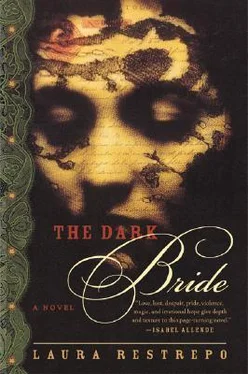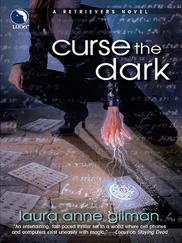“A French investigator who came around in those years made inquiries and threw out some figures that reflected that the prostitutas of Tora paid more to the state in health control and fines than the Tropical Oil Company did in royalties,” Machuca tells me. Meanwhile, the girls struggled to ward off syphilis and gonorrhea with prayers and cloths dampened with warm water, and the crosses kept cropping up on carnés and in cemeteries.
Sometime later, torrential rains came to quiet the fevers of the barrio and turned its narrow streets into rivers of mud. Nocturnal lightning flickered against the zinc roofs with fading discharges and Holy Week arrived, bringing with it a slow, sorrowful silence, in solidarity with the agonies of the crucified. Sayonara, who was once again fixated on the red Christ with the fanaticism of earlier days, tried to please him with flowers and candles and left him cigarettes and matches, plates of rice, glasses of rum, anything that would help to alleviate the bitter drink awaiting him.
The Maundy Thursday sky dawned, vaulted over with dark clouds, and the streetwalkers of La Catunga, following tradition, dressed in mourning, covered their faces with Spanish mantillas, and went barefoot, in a vow of humility. Olguita vulnerable without her steel braces, Tana stripped of her jewels, Claire drained of life, Yvonne voluptuous, Analía sober for the moment, Delia Ramos peaceful of spirit, and Machuca abstaining from cursing; the Italians, La Costeña, the Indians with their herds of children, and others, all filed barefoot along the narrow streets of sin, in voluntary penitence, which was heightened by the rain.
They emerged from the Dancing Miramar, leaving behind the barbershop, the apothecary, the billiard halls, the cantinas, the statue of the headless man, and the municipal slaughterhouse. When they reached Ecce Homo, the pealing of the bells exploded into the air and the interior of the church overflowed with lilies, while the altar was set for the last supper and the saints were clothed in purple raiment. But they kept walking.
“They didn’t enter the church?”
“The parish had forbidden them to enter unless they had publicly renounced their profession.”
“Did they really walk barefoot?”
“Barefoot and in a holy trance, without dodging mortifications or garbage heaps.”
The black pilgrimage of penitents arrived at its destination, the Patria Theater, around eleven that morning and the early show, exclusively for them, was Jesus of Nazareth with Spanish subtitles and in Technicolor, which according to Olga was almost the same as real life.
“A sacred ceremony in an unholy temple,” I comment.
“We putas were born to rub luck against the grain,” assents Todos los Santos.
From the moment that the Christ child trotted behind his sheep on the screen of the Patria Theater, before he got into his predicament, much before the terrible denouement, the women of La Catunga burst into tears. They gave free rein to a cascade of warm and comforting tears, salty and sweet like sea and river currents. They cried because they weren’t able to withstand so much death and love. They cried for the man who would pardon them on the cross, for his father Joseph’s troubles and his mother Mary’s lacerations. And they cried for themselves, for their mothers who they hadn’t seen for so long, for their fathers who they had never seen, for their own children and for the children they would never have, for their sorrows as lonely women, for all the men who had gone and those to come, for the sins they had committed and those they would commit, for the past and for the future.
They didn’t stop crying until they heard the celluloid Mary Magdalene swear and swear again that she had seen Christ resplendent, his wounds healed and gloriously resuscitated, and then they left the Patria Theater feeling lightened, free of guilt and empty of tears, prepared to bear another year of life without complaint or protest. Until the next Maundy Thursday, with its rain and tears, would come to bring the world purifying alleviation in the form of streams and torrents of water.
On the way back home along the Calle del Comercio, a few steps removed from the others, Todos los Santos and Sayonara walked arm in arm, one old and the other young, one pale-skinned and the other dark, one the mother and the other the daughter: both threatening and haughty in their black dresses, not looking back or greeting anyone.
“Mother whore, daughter whore, who does the blanket cover more?” commented the pious as they watched the pair pass.
“If the girl were hers,” murmured others, “that procuress wouldn’t have allowed her to work the street, she would have installed her in a convent school, in Bucaramanga or in Cúcuta.”
“A convent?” says Todos los Santos, terrified. “Why would I leave her in the hands of nuns? Who are those señoras to educate her better than I?”
After living together for two years, everything that Sayonara knew she had learned from her madrina . She echoed her madrina ’s expressions, had the same deep gaze, the identical habit of walking around barefoot, and of curing illnesses with infusions of parsley. She had even inherited the peculiar style of cleaning her teeth, scrubbing so hard that the brush barely lasted a month.
“Under my wing that girl was growing up beautiful and strong. In her steps I found my own footprint and in her mirror I could read the same traces of my youth.
“I taught her how to be a prostitute and not anything else because it was the trade that I knew, just as the shoemaker can’t train a bricklaying apprentice nor should a viola player try to give piano lessons.
“I did what I did without doubting my conscience,” Todos los Santos assures me, “because I have always believed that a puta can have a life that is just as clean as any decent housewife, or as corrupted as any indecent housewife.”
They say that at some moment in their itinerant existence the men from all the camps in the world, from the oil wells of Infantas to the vast fuel deposits of Iraq, passed religiously through the streets of sin in La Catunga, as if coming to fulfill a promise, because it was the heart and sanctuary of the extensive oil labyrinth. In La Catunga the circle was completed; it was the obligatory point of return for their travels.
“As a boy I had lived invisibly in Tora, leading a humble existence, hauling people and packages with my cart,” says Sacramento. “Living that way it is difficult for anyone to notice you, especially the majeres de café, who were accustomed to rubbing elbows with engineers, contractors, trained personnel. That’s why I left, thinking I would return with some distinction, which is the purpose of everyone who leaves.”
“With what they gave him for selling the cart, Sacramento bought a pair of walking shoes and started walking,” Todos los Santos tells me.
Where to? He didn’t have to ask anyone; he took off walking by the compass of the wandering multitude, joining the great river of seekers of fortune until he arrived at the oil installations at El Centro, where he found a population drowning in a persistent downpour that lashed diagonally, soaking mankind to the bone and reminding them of their helplessness. He arrived at dawn and immediately, without shrinking back from the weather’s sudden attacks, took his place in the queue under the deluge, in front of the recruiting office. After hours of waiting, with his skin wrinkled under his soaked clothing, he gathered the courage to exchange words with the man waiting behind him.
Читать дальше












